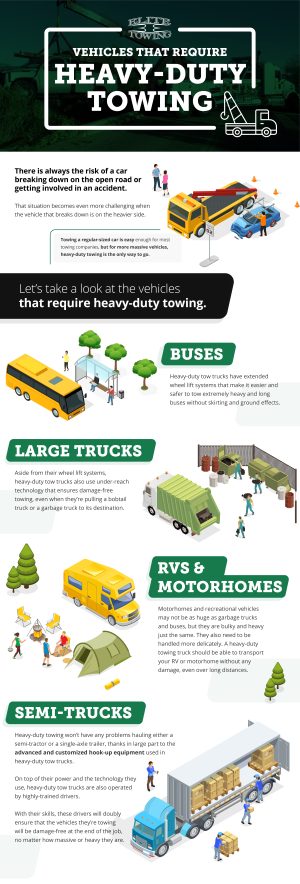Planning for Problems
No one likes thinking about road trouble. But whether you run a trucking or shipping business, school district, or enjoy RV trips with the family, you need heavy-duty towing services on speed dial. Here’s why.
When Your Road Trip Hits a Pothole
Between working from home and remote learning, you and your family are ready to get away from it all. So you load up your partner, kids, and the dogs in the motorhome and hit the highway for that road trip you put off due to the COVID pandemic.
Miles away from home—and signs of civilization—you hear a knock in your engine. Then your dashboard lights up. You made it safely to the shoulder, but your RV isn’t going anywhere on its own. Who do you call?
Elite Towing has created some helpful infographics showing which types of vehicles require heavy-duty towing services and best practices for a safe towing experience.
Does Your Vehicle Require a Heavy-Duty Tow Truck?
No matter how careful you are behind the wheel, things can go wrong out on the road. From break-downs to accidents, it’s important that you call out the right tow truck. While most cars, SUVs, and trucks can be hauled behind a regular tow truck or flatbed, a very large vehicle requires a heavy-duty towing service.
Which vehicles require a heavy-duty tow truck?
- Buses
- Large trucks
- Semi-trucks
- Motorhomes and RVs
These massive vehicles present unique challenges for towing services. Their extra length, width, weight, and odd shapes require specialized equipment for safe handling.
What Makes Heavy-Duty Trucks Different?
In addition to being substantially larger than a standard truck, heavy-duty tow trucks have specialized technology and equipment that allows for the safe handling of massive vehicles.
These tow trucks have under-reach capability that ensures damage-free towing of oversized, bulky vehicles, such as motorhomes, busses, and large trucks, without skirting and ground effects.
Long-haul truckers also make sure they know who the local heavy-duty towing services are along their routes. Not only do these tow trucks have advanced hook-up equipment, but the truck drivers are highly trained with the skill set required to operate heavy-duty tow trucks. Their specialized training and equipment mean they can tow massive vehicles safely to their destination, whether it’s a short trip or long distance.
Thinking of DIY Towing? Plan Ahead
Elite Towing developed another infographic describing how to safely tow an oversized vehicle yourself.
While the Elite Towing team recommends using experienced operators and specialized equipment, you can do your own heavy-duty towing with proper planning.
- How much weight can your vehicle tow? Whether you own a heavy-duty tow truck or you’re renting one, check the vehicle’s manual to determine its towing and payload capacity as well as its gross combination weight rating. If its towing capability exceeds the gross combined weight (trailer + cargo), you can tow your large vehicle.
- Can your hitch handle the job? Even if the vehicle can pull or carry several tons, you must be sure that the hitch can pull its weight. If it’s over the limit, you may be unable to tow safely.
- Recon your route. Make sure the roads you plan to travel allow large trailers, can handle the total weight of your vehicles, and have no low overpasses.
- Make a pre-departure checklist and check it twice. Heavy-duty towing is an exceptionally complex job. Missing a step in the process can have disastrous consequences. Double-check everything: straps, lights, tires, and brakes. If you’re towing using a truck and a trailer, double-check everything on your trailer as well.
Put Peace of Mind on Speed Dial
Whether you’re moving extra-large vehicles from one site to another, or you find yourself stranded on the side of the road, you’ll need a heavy-duty towing service to get you out of a jam. If you’re planning a trip, make sure you have the phone numbers of reputable heavy-duty tow truck operators in your contacts list.


